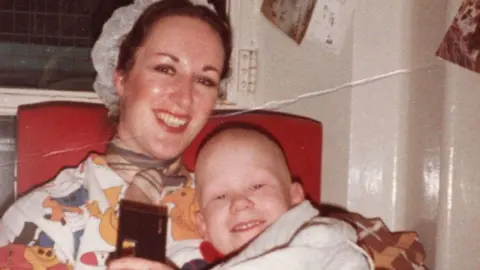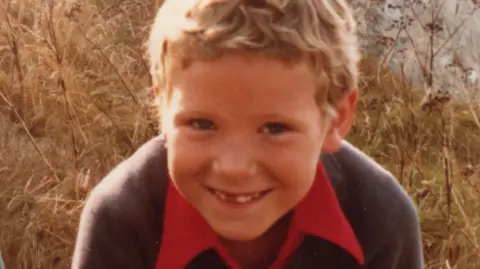By Sophie Legislation, Charlotte Andrews & Marcus White, BBC Information
 PA Media
PA MediaA mom has admitted giving her terminally unwell seven-year-old son a big dose of morphine to cease his struggling and “quietly finish his life”.
Antonya Cooper, from Abingdon, Oxfordshire, mentioned her son Hamish had stage 4 most cancers and was in “plenty of ache” earlier than his dying in 1981.
Now dealing with a terminal prognosis herself, she made the admission to BBC Radio Oxford as a part of an effort to alter the legislation on assisted dying.
Police mentioned they have been investigating her case. Assisted suicide – deliberately serving to one other individual to finish their life – and euthanasia – intentionally ending an individual’s life – are illegal in England.
 PA Media
PA MediaHamish had neuroblastoma, a uncommon most cancers that principally impacts youngsters.
He was 5 when identified and was initially given a prognosis of three months.
Following 16 months of “beastly” cancer treatment at Nice Ormond Road Hospital, his life was prolonged however he was left in nice ache, based on his mom.
She mentioned: “On Hamish’s final evening, when he mentioned he was in plenty of ache, I mentioned: ‘Would you want me to take away the ache?’ and he mentioned: ‘Sure please, mama.’
“And thru his Hickman Catheter, I gave him a big dose of morphine that did quietly finish his life.”
BBC Radio Oxford requested the 77-year-old if she believed her son knew she was intending to finish his life.
She replied: “I really feel very strongly that on the level of Hamish telling me he was in ache, and asking me if I might take away his ache, he knew, he knew someplace what was going to occur.
“However I can’t clearly let you know why or how, however I used to be his mom, he cherished his mom, and I completely cherished him, and I used to be not going to let him endure, and I really feel he actually knew the place he was going.”
She continued: “It was the fitting factor to do. My son was dealing with essentially the most horrendous struggling and intense ache, I used to be not going to permit him to undergo that.”
Requested if she understood she was doubtlessly admitting to manslaughter or homicide, she replied: “Sure.”
“If they arrive 43 years after I’ve allowed Hamish to die peacefully, then I must face the implications. However they must be fast, as a result of I am dying too,” she added.
4 a long time after Hamish’s dying, his mom is coming to phrases along with her personal incurable most cancers.
She mentioned his struggling and her personal unwell well being had cemented her emotions on assisted deaths.
“We do not do it to our pets. Why ought to we do it to people?” she mentioned.
Campaigners for a so-called “proper to die” have argued that individuals ought to have the ability to select when and learn how to die with the intention to keep away from struggling.
Critics have mentioned altering the legislation would “place pressure on vulnerable people to end their lives” for concern of being a monetary or emotional burden.
MPs lately mentioned the problem at a parliamentary debate, at which the federal government mentioned it was a matter of conscience for particular person parliamentarians reasonably than one for presidency coverage.
In a press release, Thames Valley Police mentioned it was “conscious of stories referring to an obvious case of assisted dying of a seven-year-old boy in 1981”.
It added: “At this early stage, the power is making inquiries into these stories and isn’t able to remark additional whereas these investigations proceed.”
Evaluation – Alastair Payment, BBC South Well being Correspondent
It is a vastly advanced and extremely controversial topic, and but it’s one that’s gaining momentum.
Assisted dying is the phrase used to explain a scenario the place somebody who’s terminally unwell seeks medical assist to acquire deadly medicine which they administer themselves. Assisted suicide, helps one other individual finish their life.
Each are unlawful within the UK however lately, Scotland, Jersey and the Isle of Man all introduced they’re contemplating altering the legislation to let terminally unwell folks finish their lives.
100 and ninety instances have been referred to the Crown Prosecution Service over a 15 12 months interval. Most weren’t taken ahead, there have been 4 profitable prosecutions.
You probably have been affected by any of the problems on this story, the BBC Action Line has hyperlinks to organisations which might provide help and recommendation





